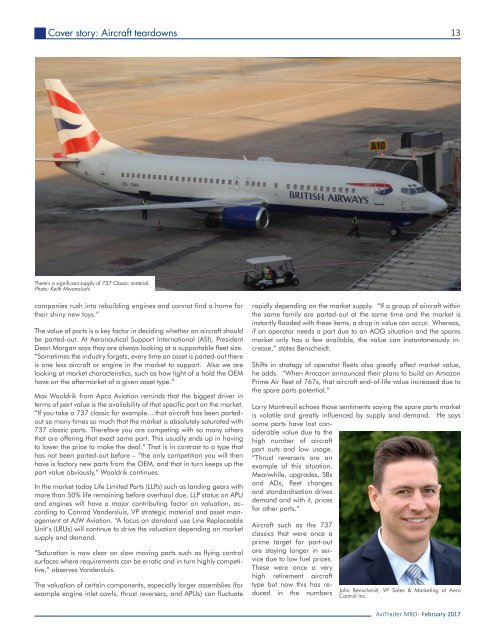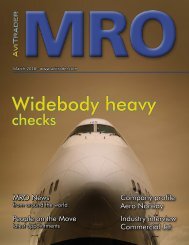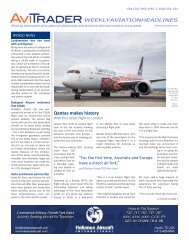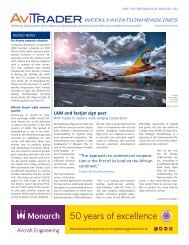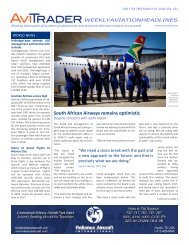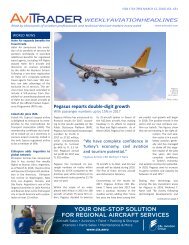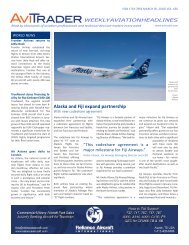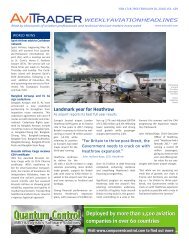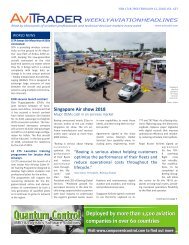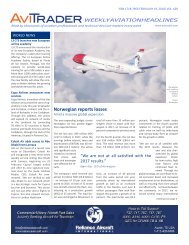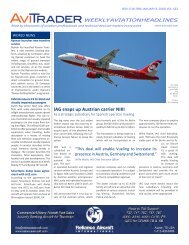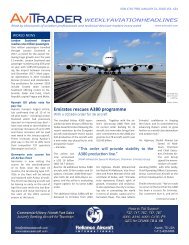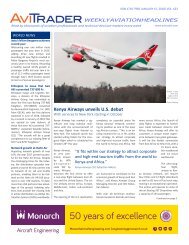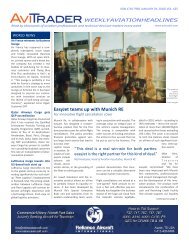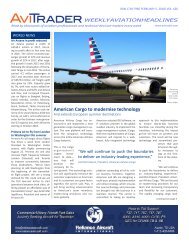AviTrader_Monthly_MRO_e-Magazine_2017-02
AviTrader_Monthly_MRO_e-Magazine_2017-02
AviTrader_Monthly_MRO_e-Magazine_2017-02
Create successful ePaper yourself
Turn your PDF publications into a flip-book with our unique Google optimized e-Paper software.
Cover story: Aircraft teardowns<br />
13<br />
There’s a significant supply of 737 Classic material.<br />
Photo: Keith Mwanalushi<br />
companies rush into rebuilding engines and cannot find a home for<br />
their shiny new toys.”<br />
The value of parts is a key factor in deciding whether an aircraft should<br />
be parted-out. At Aeronautical Support International (ASI), President<br />
Dean Morgan says thay are always looking at a supportable fleet size.<br />
“Sometimes the industry forgets, every time an asset is parted-out there<br />
is one less aircraft or engine in the market to support. Also we are<br />
looking at market characteristics, such as how tight of a hold the OEM<br />
have on the aftermarket of a given asset type.”<br />
Max Wooldrik from Apco Aviation reminds that the biggest driver in<br />
terms of part value is the availability of that specific part on the market.<br />
“If you take a 737 classic for example....that aircraft has been partedout<br />
so many times so much that the market is absolutely saturated with<br />
737 classic parts. Therefore you are competing with so many others<br />
that are offering that exact same part. This usually ends up in having<br />
to lower the price to make the deal.” That is in contrast to a type that<br />
has not been parted-out before – “the only competition you will then<br />
have is factory new parts from the OEM, and that in turn keeps up the<br />
part value obviously,” Wooldrik continues.<br />
In the market today Life Limited Parts (LLPs) such as landing gears with<br />
more than 50% life remaining before overhaul due, LLP status on APU<br />
and engines will have a major contributing factor on valuation, according<br />
to Conrad Vandersluis, VP strategic material and asset management<br />
at AJW Aviation. “A focus on standard use Line Replaceable<br />
Unit’s (LRUs) will continue to drive the valuation depending on market<br />
supply and demand.<br />
“Saturation is now clear on slow moving parts such as flying control<br />
surfaces where requirements can be erratic and in turn highly competitive,”<br />
observes Vandersluis.<br />
The valuation of certain components, especially larger assemblies (for<br />
example engine inlet cowls, thrust reversers, and APUs) can fluctuate<br />
rapidly depending on the market supply. “If a group of aircraft within<br />
the same family are parted-out at the same time and the market is<br />
instantly flooded with these items, a drop in value can occur. Whereas,<br />
if an operator needs a part due to an AOG situation and the spares<br />
market only has a few available, the value can instantaneously increase,”<br />
states Benscheidt.<br />
Shifts in strategy of operator fleets also greatly affect market value,<br />
he adds. “When Amazon announced their plans to build an Amazon<br />
Prime Air fleet of 767s, that aircraft end-of-life value increased due to<br />
the spare parts potential.”<br />
Larry Montreuil echoes those sentiments saying the spare parts market<br />
is volatile and greatly influenced by supply and demand. He says<br />
some parts have lost considerable<br />
value due to the<br />
high number of aircraft<br />
part outs and low usage.<br />
“Thrust reversers are an<br />
example of this situation.<br />
Meanwhile, upgrades, SBs<br />
and ADs, fleet changes<br />
and standardisation drives<br />
demand and with it, prices<br />
for other parts.”<br />
Aircraft such as the 737<br />
classics that were once a<br />
prime target for part-out<br />
are staying longer in service<br />
due to low fuel prices.<br />
These were once a very<br />
high retirement aircraft<br />
type but now this has reduced<br />
in the numbers<br />
John Benscheidt, VP Sales & Marketing at Aero<br />
Control Inc.<br />
<strong>AviTrader</strong> <strong>MRO</strong> - February <strong>2017</strong>


